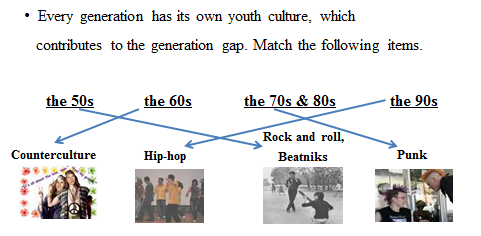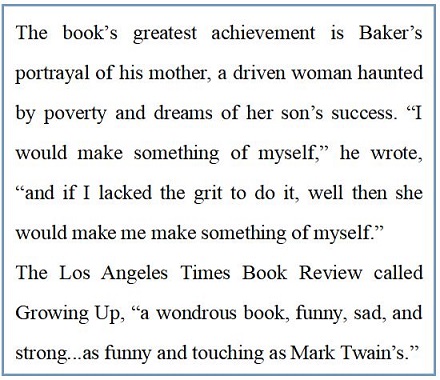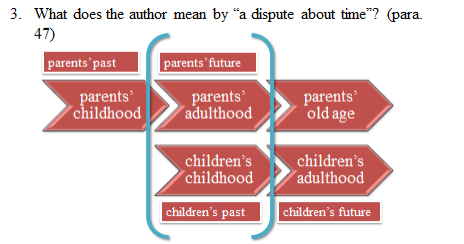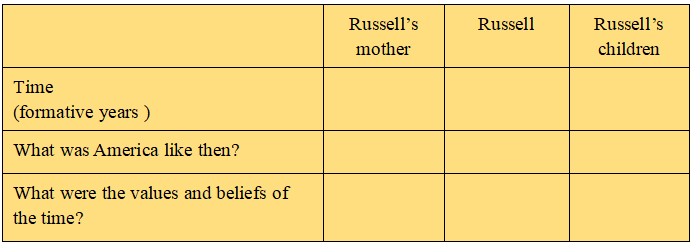Text Analysis: In My Day
 知识点一
知识点一
I. Warming up
1. Discussion
What is the meaning of the title? Who tend to use the expression very often? Why do they often say this?
2. Generation Gap

II. Background
Author:Russell Baker
•A columnist for The New York Times, where he applies his unique brand of humor to social commentary.
•The present text is taken from Russell Baker’s autobiography, Growing Up, which won him the second Pulitzer Prize in 1983.
•With a moving mix of humor and sadness, Baker insightfully recounts the struggles the family endured in depression-era after his father passed away (when Baker was only 5).


III.Text analysis
1.Theme


2.Structure

3.Detailed Analysis
Part I: Discussion (paras. 1-9)
1.Russell says, “At the age of eighty my mother had her last bad fall…” What inferences can you draw from this sentence?
2.What was his mother’s state of mind after her last bad fall?
3.Russell says, “…when I did phone back she was all right, although she wasn’t all right, of course…” He uses the phrase “all right” twice. Do they mean the same?
4.Russell’s mother stayed in a nursing home. What is a nursing home?
5.Do you think it is a good idea for children to send their aged parents to this kind of institutions?
Part II: Discussion (paras. 10-15)
What kind of woman was Russell’s mother when she was young? Give a profile of her.

2. In what way did Russell’s mother’s ways reflect the values of the time she lived in?
•“I tell people exactly what’s on my mind,” she had been fond of boasting… (para. 11)
•“If they don’t like it, that’s too bad,” was her customary reply, “because that’s the way I am.” (para. 13)
→Was she apologetic?
3. Point out the humorous touches in this part of the text.
4.Point out the use of a pun in the following sentence:
•One Thanksgiving…she tripped on the stairs and tumbled down,
•ending at the bottom in the debris of giblets, hot gravy, and
•battered turkey. (para. 15)
Part III: Discssion
1.As Russell sat by his mother’s bed, seeing her present state, his impulse was to argue her back to reality, why?
2.What was the doctor’s diagnosis of his mother’s illness? Did Russell agree with him? What did he come to see about his mother’s problem?
Part IV: Discussion (paras. 39-45)
1.How did the author react to his mother’s senility from a son’s point of view?

2.Russell recalled a visit to his mother three years earlier. What does this visit show about Russell and his mother? Why couldn’t he understand his mother’s unhappiness? (paras. 39-40)
3.After he realized that his mother could recapture happiness in her past memory, Russell stopped trying to argue her back to reality, what did he do instead? What does that mean?
4.Which period was his mother’s happiest time in her life? Was Russell able to travel along with his mother to the dead decades? Why (not)?
Part V: Discussion (paras. 46-end)
1.Why can age stir one’s curiosity about parents’ past?
2.Why was Russell’s childhood hard?
The Great Depression


4. What is the author’s view of generation gap?
5. What is the author’s view on how to handle the disconnection between parents and children?

IV. Reinforcement:
1)Writing Techniques
1.Genre:
•a combination of narration and discussion, with two strands running through it:
•one is the account of the changes that occurred to his mother after her last bad fall
•the other is his reflection of parent-child disconnection
2.Typical writing technique: flashbacks
3.Figures of speech:
•humorous touch
•pun
•simile
•metaphor
•parallelism
2)Activity
•One important factor contributing to the generation gap is that different generations live in different historical times and may hold different social values, which may lead to the difficulty in understanding each other.
Please put Russell, his mother and his son back in their respective times by seeking clues in the text and notes, and by resorting to your knowledge of American history.

